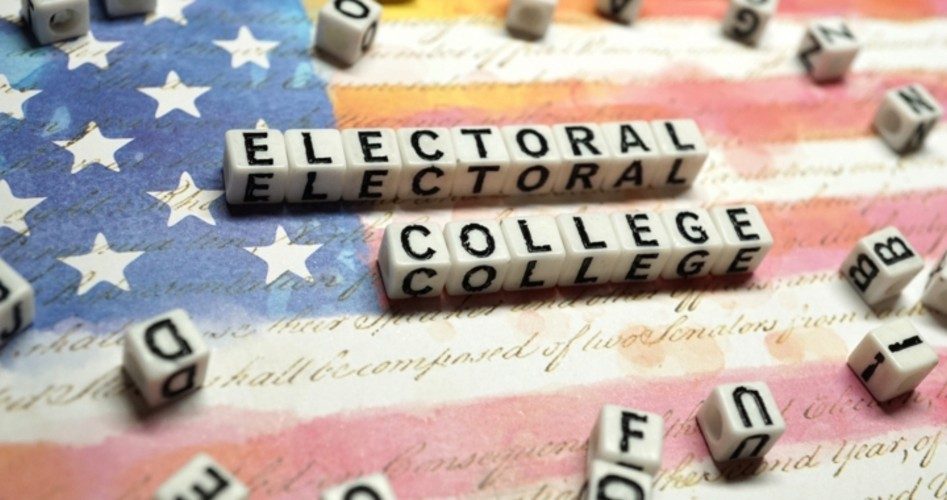
The noted English philosopher G.K. Chesterton once said, “Don’t ever take a fence down until you know the reason it was put up.”
This quotation comes to mind when one hears the response that former U.S. Representative Robert Francis “Beto” O’Rourke (D-Texas) had on Tuesday to the call by Senator Elizabeth Warren (D-Mass.) to “get rid of the Electoral College.” He said there is a “lot of wisdom” to ending the Electoral College. Both are seeking the Democratic nomination for president, and they made their comments this week — Warren on Monday night in Mississippi at Jackson State University, O’Rourke on Tuesday in Pennsylvania.
Warren said, “My view is that every vote matters and the way we can make that happen is that we can have national voting, and that means get rid of the Electoral College.”
When asked about Warren’s proposal, O’Rourke told Garrett Haake of MSNBC, “I think there’s a lot to that. Because you had an election in 2016 where the loser got three million more votes than the victor. It puts some states out of play altogether, they don’t feel like their vote really counts. So, if we really want every person to vote and give them every reason to vote, we need to make sure their votes count and go to the candidate of their choosing. So, I think there’s a lot of wisdom to that and it’s something we talked about during that last Senate race in Texas.”
That is the Senate race in which O’Rourke lost to Republican Ted Cruz — perhaps indicating that the voters of the Lone Star State have more wisdom than either O’Rourke or Warren.
{modulepos inner_text_ad}
The Electoral College is the name given to the presidential election system created by the Constitution. In an effort to get the Constitution ratified, James Madison, John Jay, and Alexander Hamilton authored a series of newspaper articles in New York that are known as The Federalist Papers. In The Federalist, No. 83, Hamilton explained why the constitutional framers chose this mode of election.
“The mode of appointment of the Chief Magistrate of the United States is almost the only part of the system, of any consequence, which has escaped without severe censure, or which has received the slightest mark of approbation from its opponents.” Hamilton added that the method of electing the president would “afford as little opportunity as possible to tumult and disorder,” and while it was not a perfect system, it was “excellent.”
Neither Warren nor O’Rourke addressed Hamilton’s remarks, but their reasons for wanting to abolish a system that he called “excellent” are readily apparent — they believe the Democratic Party candidate for president has a better chance of winning a national popular vote than the state-by-state popular vote system used by the Electoral College.
There is practically no chance that the Constitution could be amended to abolish the Electoral College, as it would take a two-thirds vote by each house of Congress and ratification by three-fourths of the states. Because of this, its detractors have turned to an effort of dubious constitutionality — the National Popular Vote Interstate Compact. Under this proposal, once enough states with enough electoral votes agree to cast their electoral votes for the “winner” of the national popular vote, rather than the winner of their state’s popular vote, it would go into effect. As of now, enough “blue” Democrat states have signed on to account for 181 electoral votes, but they need 270.
The U.S. Constitution explicitly requires any interstate compacts to first obtain the approval of Congress, but as they do with so much of the rest of that document, the power-seeking supporters of this scheme are prepared to ignore that provision.
So, referring back to Chesterton, why was this fence [the Electoral College] put up, anyway?
First of all, the United States is a federal republic, not a unitary democracy. We elect representatives from congressional districts and senators from states. These elected officials are accountable to the voters of their own state, not to the country as a whole. In other words, voters from Texas choose their representatives, and people from California choose theirs. It is unlikely that Ted Cruz could get elected in San Francisco, but it is also unlikely that Nancy Pelosi could win in Texas.
One of the arguments used by those who want to eliminate the Electoral College is that some states are by-passed in the presidential contest, because there is no reason, they say, for a presidential candidate to go to California (we know it is going to go Democrat) or Oklahoma (where the Republican has carried every county of that state for the last four elections). But, they do go to Iowa and New Hampshire, states that no candidate would bother with in a national popular vote system.
In short, if we were to change to a national popular vote system, it would be the big cities of the country that the candidates would visit. Rural America would be largely ignored. But why should the interests of urban areas be paramount, while ignoring the heartland of the country? The Founders understood all of this, even if Warren and O’Rourke do not (or do not care).
And why should the presidential election be the only contest that concerns voters? Don’t they elect members of Congress, governors, state legislators, and the like, too? Do we really want our president to be chosen by voters who are so apathetic and/or ignorant that they have no interest in who represents them in Congress or the state’s legislature?
Can one imagine a national election under a national popular vote in which one candidate garnered, say, 4,000 votes more than the next closest competitor, out of, say, 130 million votes? Under the Compact system, there would be no national recount. And, even were we to actually amend the Constitution, could our country survive a national recount of a presidential election that close, considering how divided we already are?
As Tara Ross, author of The Indispensable Electoral College, said recently, “Getting rid of the [Electoral College] now, when we are so angry and divided.… Well, it’s the worst possible solution.” Mirroring Chesterton’s sage comment, Ross added, “We are better off trying to remember why we have the Electoral College in [the] first place.”
Writing in his Pulitzer-prize winning The Making of the President 1960, Theodore White lauded “the wisdom of the Constitutional Founders who, in their foresight, invented the device of the Electoral College, which, while preserving free citizen choice, prevents it from degenerating into the violence that can accompany the narrow act of head-counting.”
Indeed, what we have is the “wisdom” of the Constitutional Founders versus the “wisdom” of Elizabeth Warren and Beto O’Rourke. The principal reason that many Americans do not presently favor retention of the Electoral College is that they have never heard why it — like Chesterton’s fence — was “put up” to begin with. Which brings us to another of Chesterton’s quotations that we could aptly apply to the fallacious arguments of Warren and O’Rourke: “Fallacies do not cease to be fallacies because they become fashions.”
Image: Kameleon007 via iStock / Getty Images Plus



